Analysis of corporate climate advocacy and policy engagement since COP28 in Dubai reveals a suite of narratives used by major companies and industry associations in the fossil fuel value chain to undermine the world’s transition away from fossil fuels. Such narratives relate to the affordability of certain energy types, the need to be “technology neutral” in policy development, and other messages related to the future of oil and gas.
InfluenceMap has recorded over 2,400 instances of anti-transition narratives promoted by more than 100 fossil fuel companies and industry associations since the conclusion of COP28 in November 2023. In general, industry associations tend to push these narratives with greater intensity than companies: the Australian Energy Producers ranks highest in anti-transition narrative use, followed by the American Gas Association (AGA). Many of the companies and groups that promote these narratives— including Petrobras, TotalEnergies, Eni, Shell, Exxon, Chevron, AGA, American Petroleum Institute, Instituto Brasileiro de Petróleo e Gás, and the International Gas Union— are usually represented at COP.
InfluenceMap analysis finds all major industry narratives to be misaligned with Intergovernmental Panel on Climate Change (IPCC) recommendations. The continued promotion and use of fossil fuel products not only sustains greenhouse gas emissions but also jeopardizes global climate targets, accelerating the pace of global temperature rise and increasing the likelihood of severe climate impacts. Industry use of these narratives to influence global policymaking risks derailing robust climate policy development by prioritizing fossil fuels over zero-carbon alternatives.
Some narratives are used more frequently; however, all three are used to some extent around the world. In all regions, “Solution Skepticism” and “Affordability and Energy Security” narratives are deployed with high intensity, with over 1,000 instances of each recorded overall since 2023. The “Policy Neutrality” narrative appears in over 250 instances globally, relatively less but still significant. North America sees the highest use of each, followed by Asia-Pacific and Europe.
InfluenceMap’s July 2024 report identified a playbook consisting of three broad narratives used by fossil fuel producers to oppose, weaken, and delay the energy transition.
“Solution Skepticism” downplays the viability of alternative energy sources to fossil fuels and the negative impacts associated with fossil fuel use.
“Policy Neutrality” calls for technology neutral policy and is unsupportive of government intervention, instead preferring market-based solutions while stressing the need to protect consumer choice.
“Affordability and Energy Security” stresses the economic concerns of moving away from fossil fuels while placing fossil fuels central to both energy security and energy affordability.
Each of these narratives was determined to be misaligned with science-aligned policy pathways set out by the Intergovernmental Panel on Climate Change (IPCC). More details on each narrative can be found within the linked title.
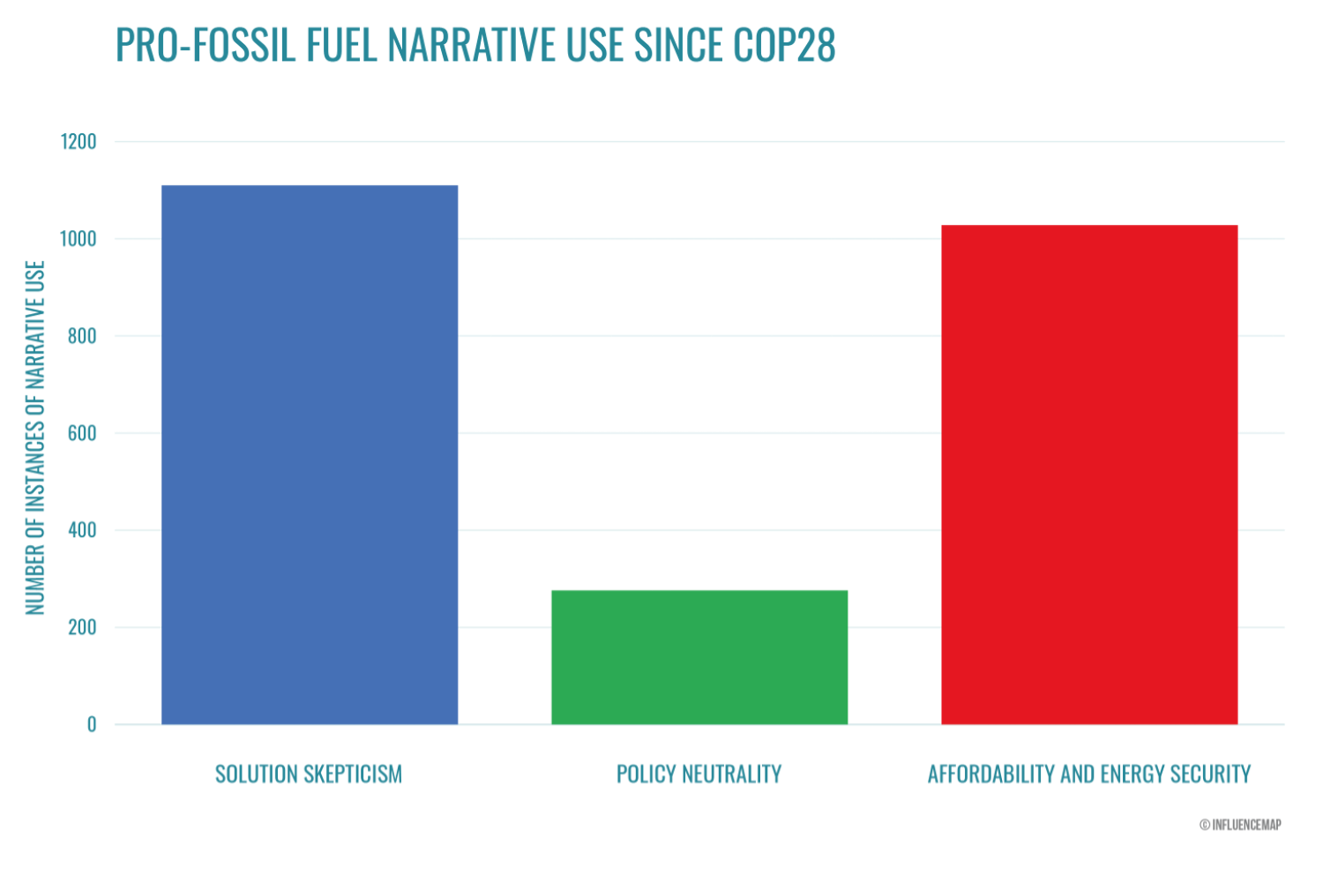
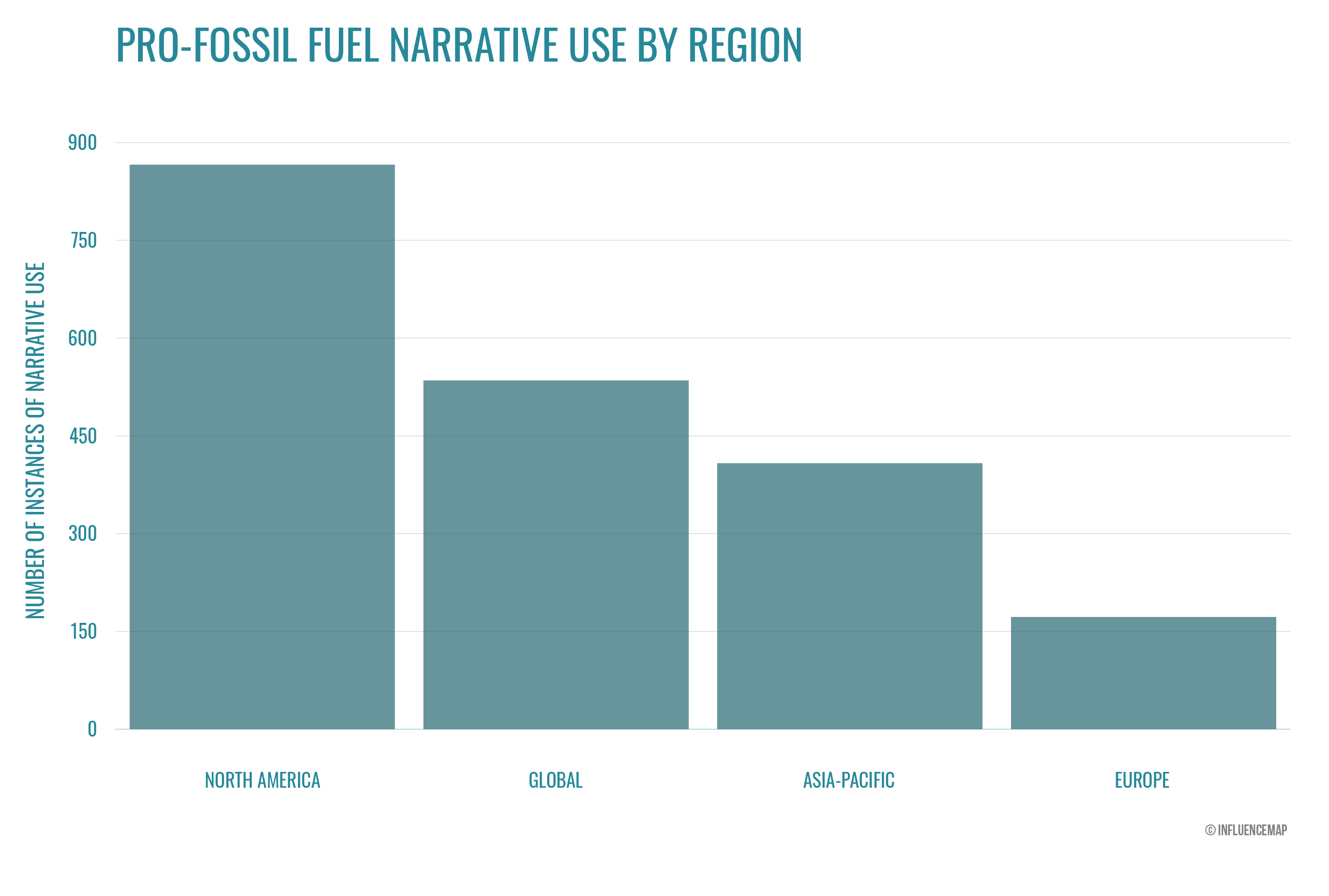
Analysis of the climate policy engagement of companies and their industry associations shows extensive use of pro-fossil fuel narratives over the past year, with over 2,400 instances of these anti-transition narratives promoted by more than 100 fossil fuel companies and industry associations since the conclusion of COP28 in November 2023.
The themes of "Solution Skepticism" and "Affordability and Energy Security" are still prevalent among fossil fuel companies and industry associations, with more than 1,000 instances of each logged in the LobbyMap database since COP28. To a lesser degree, "Policy Neutrality" is also prevalent, with over 250 instances of use across companies’ and associations’ climate-related policy advocacy. The use of these pro-fossil fuel and anti-transition narratives poses a risk to ambitious climate policies, while bolstering measures that facilitate ongoing fossil fuel supply.
For instance, in April 2024, the American Gas Association deployed the “Solution Skepticism” narrative to advocate in favor of fossil fuels to policymakers in Illinois, US. Similarly, in May 2024, the International Association of Oil and Gas Producers used the “Affordability and Energy Security” narrative to advocate for the long-term role of fossil gas in the energy mix in comments to European Union policymakers. In July 2024, the Australian Energy Producers used the “Policy Neutrality” narrative to advocate for new fossil fuel projects in comments to policymakers.
Based on insights from the LobbyMap platform, which monitors corporate climate policy engagement in North America, Europe, and the Asia-Pacific, anti-transition narratives are most prominent in North America, with substantial use also observed in the Asia-Pacific. A significant number of narratives were also found in evidence pieces not linked to any specific region, illustrating their widespread use in general messaging efforts not tied to specific policy in addition to detailed, regionally specific engagement.
Analysis of the narratives used by corporates and their industry associations within their climate-related policy engagements is particularly important following the agreement reached at COP28 in 2023, in which countries committed to measures to “transition away” from fossil fuels in the energy system. The agreement was reached with over 40 companies and industry associations tracked by InfluenceMap present at the conference, including many from the oil and gas sector.
As a tool to help stakeholders following the discussions at COP29 related to fossil fuels, InfluenceMap has tracked, analyzed, and fact checked the most prevalent narratives deployed by the fossil fuel industry since the conclusion of COP28 in November 2023. More details on each narrative can be found within the linked titles below.
"Solution Skepticism" aims to downplay or amplify the perceived challenges of transitioning away from fossil fuels to alternative energy sources. It includes arguments that portray fossil fuels — especially gas — as 'clean' or 'low carbon’, or that emphasize greenhouse gas (GHG) emissions from renewable energy alternatives. The narrative also includes claims that cast doubt on the viability of a renewable-dominated energy system or that understate the level of support needed for such a transition, and frequently supports future technological innovations over immediate emissions reductions.
Count: 1110
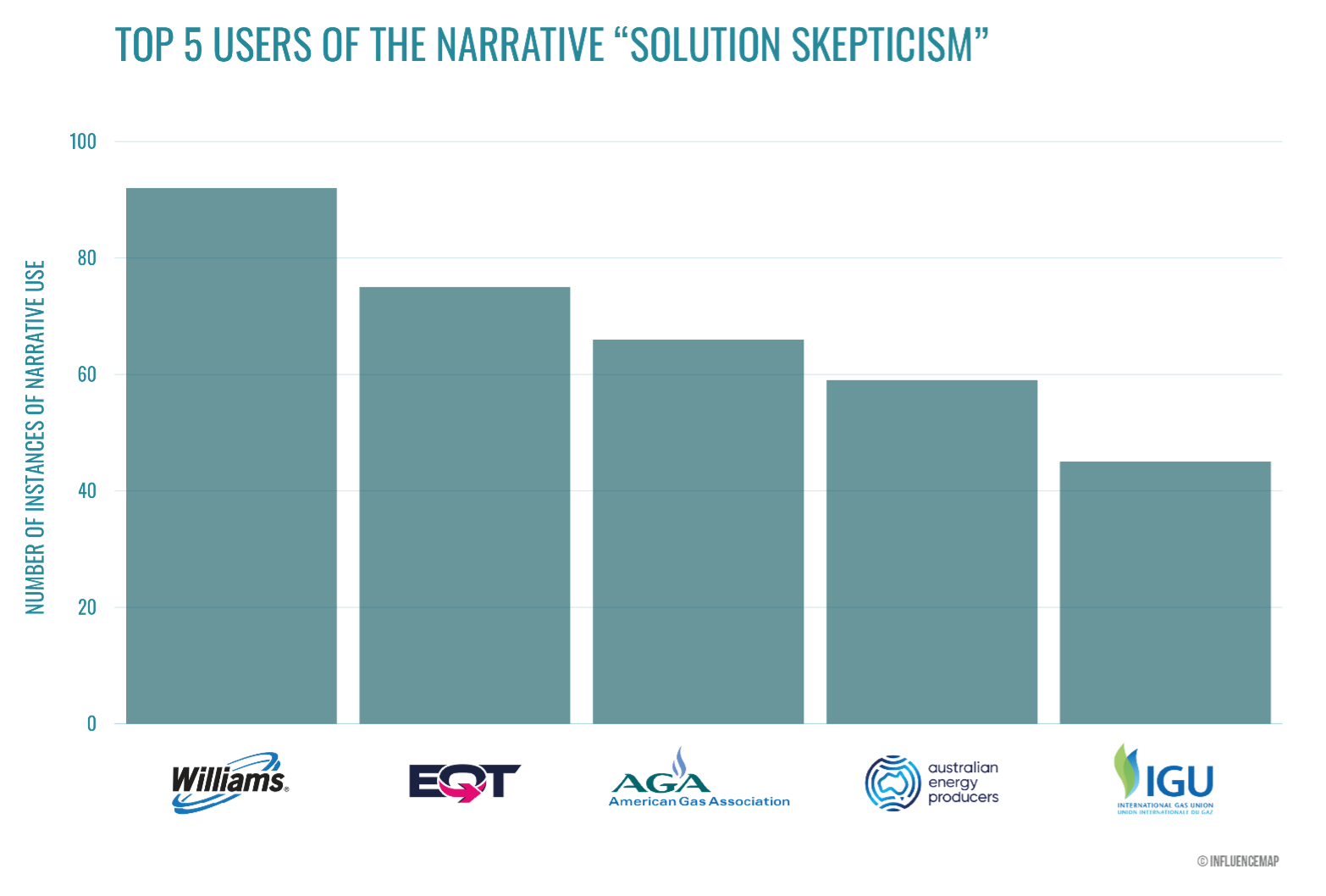
The narrative of “Solution Skepticism” is misaligned with science-based recommendations, as it argues that alternatives to fossil-based technology and infrastructure are either unnecessary or infeasible. By contrast, the IPCC's recent report emphasizes that transitioning from fossil fuels to renewables contributes significantly to broader sustainable development goals and that the alternatives are fully viable. The report finds that replacing fossil fuels with renewables can have major synergies and trade-offs with a broader agenda of sustainable development if a balance is established in relation to land use, food security, and job creation (IPCC, AR6, WGIII, Chapter 17, p. 45). It adds that the electrification of passenger transport in light-duty vehicles (LDVs) is well underway and that recent improvements in GHG intensity of new internal combustion engine (ICE) vehicles is slowing down, and forthcoming ICE improvements are not sufficient to meet deep decarbonization levels in the transport sector on their own, highlighting the need for further policy measures to fully decarbonize the sector (IPCC_AR6_ WGIII_Chapter10, p.16-17)
Downplaying fossil fuel emissions
Claims that fossil fuels are part of the transition
Downplaying the feasibility or practicality of renewables and electric vehicles
Claims that future technology developments will negate the need to transition
Downplaying the support required for alternatives to fossil fuels
The “Policy Neutrality” narrative as deployed by the oil and gas sector inserts fossil-fuel reliant technologies into policies and discussions that specifically aimed to reduce fossil fuel dependence. As such, use of this narrative by fossil fuel interests reopens the debate on the best technology pathway for climate mitigation, diminishing the central importance of reducing fossil fuels and encouraging a “technology neutral” approach to reducing fossil fuel emissions instead.
Count: 276
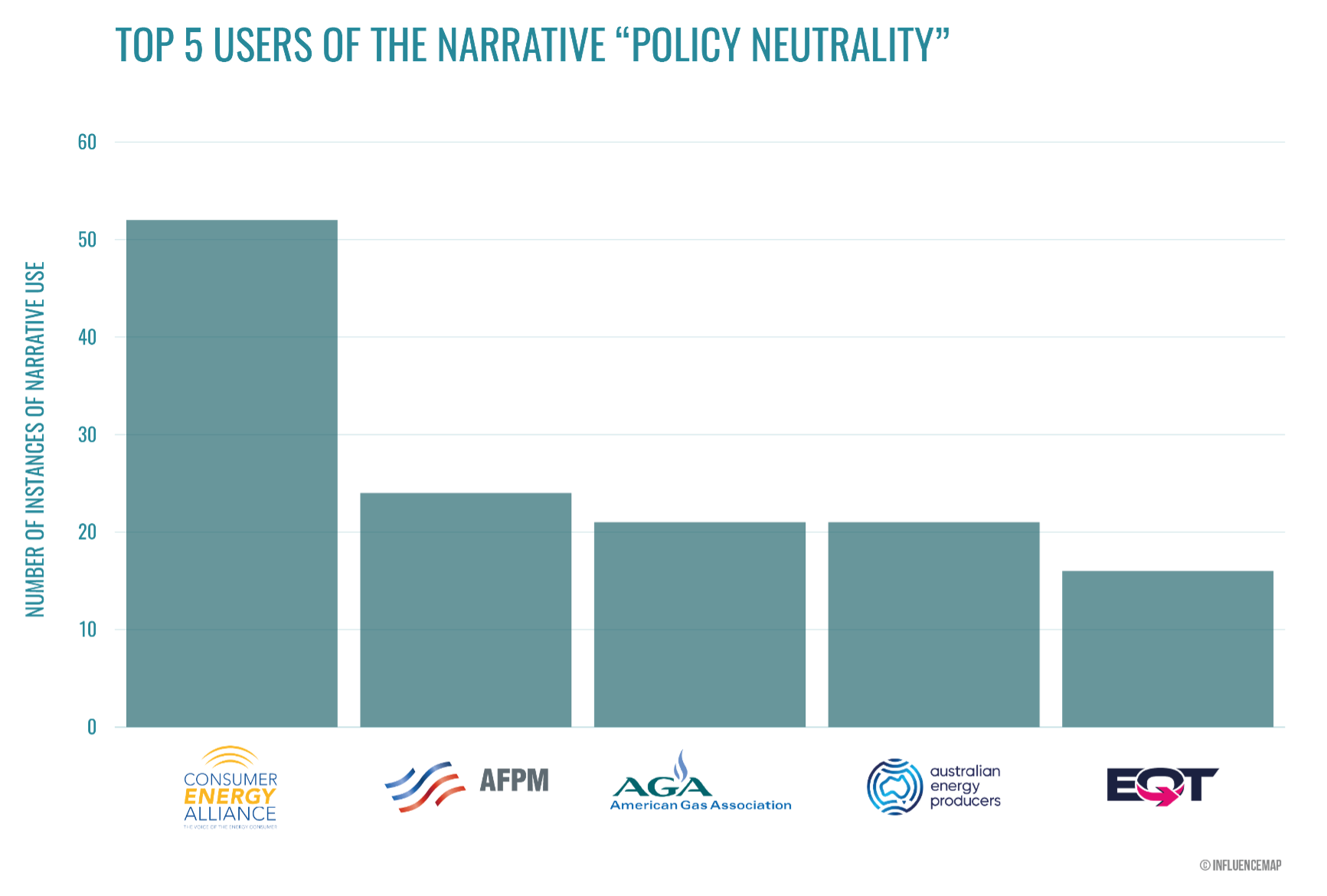
Advocating for an “all-of-the-above” or “technology neutral” energy strategy, while seemingly inclusive, can be misleading in the context of 1.5°C aligned climate scenarios. The IPCC explains that high technology costs limit market adoption, and therefore, new technologies can struggle to compete with incumbent technology even if they would have positive societal impacts (IPCC_AR6_WGIII_ Chapter14, p. 10).(IPCC, AR6, WGIII, Chapter 14, p.10). IPCC research underscores the role of "technology specific" policy as having "led to a greater use of less carbon intensive (e.g., renewable electricity) and less energy intensive (especially in transport and buildings) technologies," noting that the uptake of renewable energy sources globally is largely attributable to this form of policy (IPCC_AR6_WGIII_Chapter14 p.31)(IPCC, AR6, WGIII, Chapter 14, p.31).
Advocating for technology neutral policy
Stressing the need to protect consumer choice
Opposing government intervention
This narrative includes arguments claiming that a transition away from fossil fuels threatens energy security, affordability, economic stability, or jobs. At the same time, it highlights the economic benefits associated with fossil fuel development and use. The narrative aims to emphasize the economic and political risks of shifting from fossil fuels to alternatives, while suggesting that renewables and electric vehicles will undermine security or fail to offer the same advantages as fossil fuels.
Count: 1028
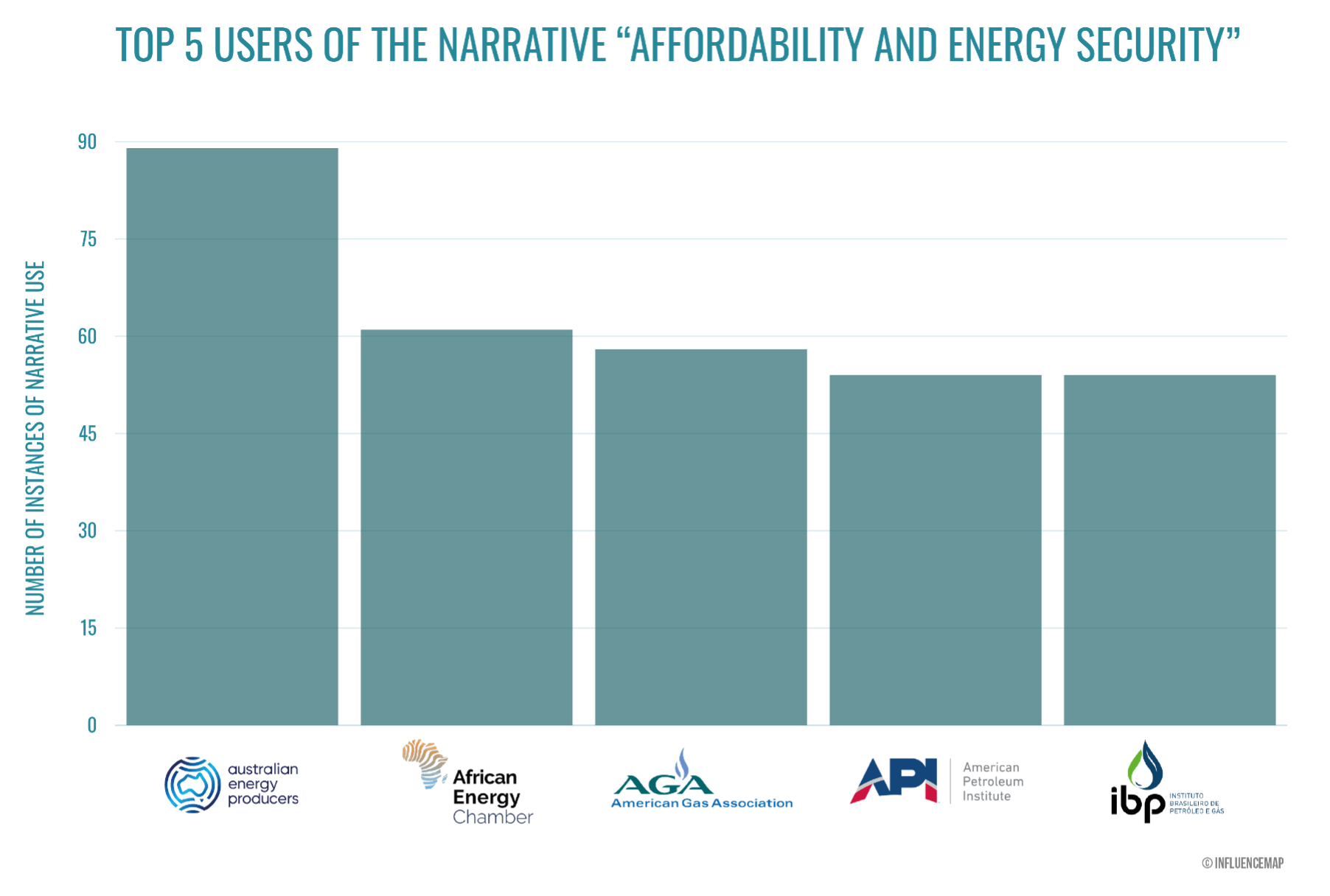
Comparing the narrative “Affordability and Energy Security” with science-based guidance reveals clear misalignment, as with all other narratives examined above. The IPCC underscores that renewables can now compete without financial support and are now often cheaper than fossil fuels in various regions (IPCC, AR6, WGIII, Technical Summary, p. 43). They underscore that the development of renewable energy is a “crucial measure” for enhancing energy access and security and that electric vehicles can enhance grid stability (IPCC, AR6, WGIII, Chapter06, p. 72). The reports also highlight the “economic inefficiency” created by fossil fuel subsidies, estimating that double the amount is spent on fossil fuel subsidies compared to renewables (IPCC, AR6, WGIII, Chapter06, p. 36). In the realm of transportation, the IPCC notes the increasing competitiveness of electric vehicles compared to internal combustion engine (ICE) technology (IPCC, AR6, WGIII, Technical Summary, p. 43).
The transition will hamper economic development
The transition would have a negative impact on energy security and affordability
The transition is unaffordable and will have a negative impact on the economy
Stressing the positive contribution of the fossil fuel industry on the local economy and jobs
The transition will lead to energy shortfalls and product supply issues
The transition will impact national energy independence or national security